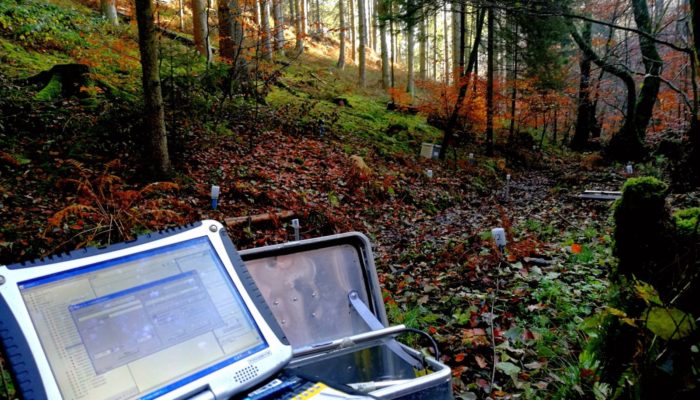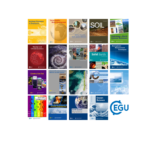
Researchers and those in academia sooner or later come across the scientific editor: the gatekeeper of scientific journals. The editor plays a key role in the publishing process, working closely with authors and reviewers to implement an unbiased peer-review process that upholds rigorous standards. They are often experienced scientists and experts in their field who ensure that the published research is scientifically sound, of high quality, and of interest to the journal audience.
But have you ever wondered what it takes to become a scientific editor? Can just about anyone be an editor or is this a role only for a select few? This week, in celebration of 20 years of EGU’s first open access journal Atmospheric Chemistry and Physics (ACP), we spoke to three senior editors of the journal to tell us what it takes to become a good scientific editor.
Click here to view the full webinar with ACP senior editors Rolf Müller, James Allan and Martina Krämer. This blog summarises the main takeaways from the webinar discussion, so keep reading!
Being an editor requires ‘special skills’
Not everyone has what it takes to be a journal editor. The role demands a delicate mix of hard and soft skills, with the ability to blend both as and when the situation arises. Some of these skills include:
- Ability to assess the context, novelty and importance of the work submitted
- Passion to write and create scientific content that can interest the journal audience
- Ability to interpret graphics and make suggestions for improvement (this can be learned at a later stage too, through tutorials or short classes)
- Knowledge and time to find the right kind of reviewers for papers
- Ability to adjudicate disagreements between authors and reviewers in a fair manner
- A diplomatic nature – either inherent or learned – as editors often make “unpopular decisions”
- Ability to make difficult decisions and justify them to all parties involved
- Capacity to show appreciation to reviewers who lend their time to the process
- Patience to manage and adapt to different working styles
There is usually a right time (and a not-so-ideal time) to be an editor
All three webinar speakers agree that there is indeed a “right time” to become an editor. Typically, they say, early to mid-career stage is ideal. It does helps to first build some publishing experience – either as a lead or co-author of a paper. Having a paper with citations also gives you an edge if you are contemplating an editor role.
Researchers who tend to take long field trips or have an overly packed schedule should consider putting off being an editor – at least until they have some spare time to devote to the role. Often, journal editors take up this responsibility in a volunteer capacity; they are truly passionate about the publishing process and understand that it requires a certain degree of commitment.
How to become an editor
In most cases, a journal editor is selected by other editors who forward their suggestions to the executive editor. They also maintain a list of suitable candidates on a regular basis. Today, more and more journals recognize the need to recruit editors from different career stages and from under-represented regions of the world, such as from the East and Global South. So don’t hold back from applying to those exciting positions!
You can become an editor by:
- Making your interest known to senior editors by contacting them directly
- Positioning yourself as a subject matter expert – especially if it’s a niche field
- Participating in active discussions of open papers
A day in the life of an editor: what to expect
Most editors are required to handle about six papers a year and do not really have an issue managing this workload. Editors have the option to pick papers that they believe are best suited for them to review. If you don’t actively choose enough papers though, some will be assigned to you.
A major responsibility as an editor is to find the right kind of reviewers – this step can be quite time consuming as it requires you to dive into the paper and the subject matter in detail.
The next task is to ensure regular communication with the reviewers throughout the publication process. Regular communication means keeping the reviewers in the loop during and after their feedback has been addressed, as this shows appreciation for their time and effort. This blog explains the full process of interactive peer review in EGU’s open access journals.
When a paper is finally accepted, the editor can decide whether to highlight it – a step that positions the paper as interesting to broader audiences.
Challenges that come with being an editor
Every job comes with its fair share of challenges, and an editor’s job is no exception. Here are some of the common issues that may arise which editors must address in a timely manner:
- Papers that are beyond or just on the margin of the journal’s area of focus
- Papers that contain plagiarized text or duplicated images
- Unhelpful or poorly detailed reviewer feedback that does not help in decision making
- Differing opinions between reviewers on a single paper. It then becomes the editor’s job to moderate these differences and arrive at common ground that is best for the paper
- Reviewers who let their opinions dominate the rest. In such cases, editors must be sure to give equal say to all reviewers involved in the process
- Unprofessional conduct, either on the part of the author(s) or reviewers involved
- Authors who make insufficient revisions and/or do not adequately address the feedback provided. Editors must then take a firm line with authors in an open and transparent manner
- Disputes on technical details – especially if they are on the edge of the editor’s own expertise – in such cases, the editor should consider involving more reviewers in the process
In closing, the senior editors reiterate that an editor’s role can be exciting but may not be suited for just about everyone: it takes a certain skill set to work with people of different backgrounds and working styles to see a paper through review to publication.
For researchers who are already in the first few months or years of editor roles, the senior editors have two pieces of advice to share:
(1) If you have a difficult or underwhelming paper which you believe will not make it past the discussions stage, it is best not to go into more than one round of review with the authors. This helps respect the authors and reviewers time and does not lead to heightened disappointment at the end.
(2) Do not pick too many papers if you have a hectic schedule. It is better to be available for a few papers that you can do justice to, rather than push yourself through rushed reviews.
Do you have any advice or experiences of your own to share with our readers about being a scientific editor? Let us know in the comments below!
Watch the full #EGUwebinar:



